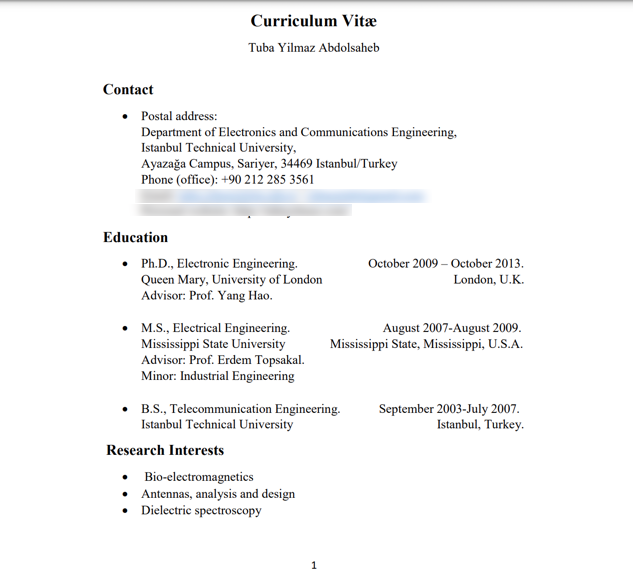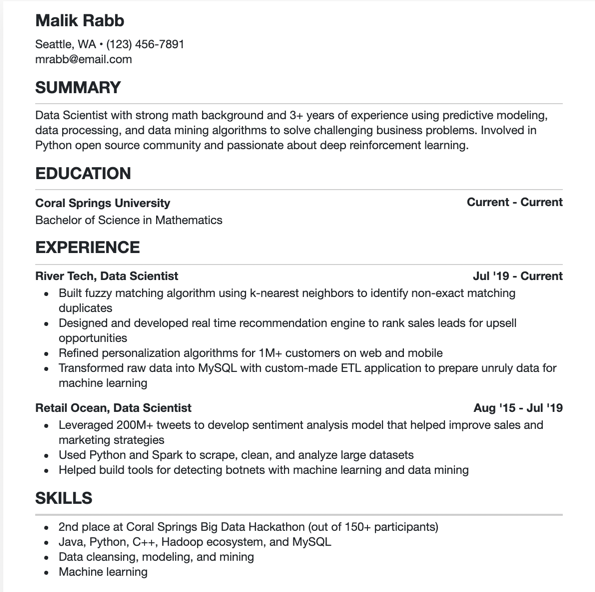Depending on where you live and the field you're in, you've probably heard the terms "résumé" and "curriculum vitae" or "CV". And you might be wondering – are they the same thing? Are these terms interchangeable?
Well, the answer isn't a simple yes or no. Turns out, it basically depends on whether you're in academia or not, and possibly where you live. But more on that below.
If you're job hunting, or just want to keep your credentials up to date, you'll want to make sure you have a résumé or a CV on hand.
Let's look at each document in detail. In this article you'll learn what a CV is, how it differs from a résumé (and when that distinction matters), and when you might need each one.
What is a CV?
A CV, or curriculum vitae, actually has two meanings, depending on the field you're in.
But first, what does the Latin "curriculum vitae" actually mean? Well, it means "the course of (one's) life". Which makes it sound like quite an epic document, depending on how much life experience you've had.
CVs in Academia
If you're in academia and/or are applying to an academic position, this makes sense. A CV in this case refers to a detailed document that explains your educational and professional background, any publications you have, research you've done and so on – in great depth.
You'd also use this type of CV if you're applying for large grants or fellowships, for certain jobs in medical and scientific fields, and so on.
CVs in Industry Jobs
On the other hand, in both British and American English, the term CV can be used to reference a short document that catalogues your education, career history, and skills. It's usually no more than a page (front and back at the most) and provides the most important highlights you want your potential employer to know.
Basically, in this case, a CV is what you'd send to a company for whom you want to work as a data scientist, programmer, business development lead, and other jobs like those ("industry" jobs). It would be the first thing the employer likely sees when considering your application, and they'd probably spend about 6 seconds reviewing it.
So, just to summarize:
- In academia, a CV refers to an in-depth personal and professional life summary that includes education, career history, publications, and other professional achievements and awards.
- In other industries – like tech or business – the term CV refers to the short education, career, and skills summary you submit with job applications.
CV vs Résumé – What Are the Main Differences?
The shorter CV might sound familiar – and that's because it's basically interchangeable with a résumé. In the United States and elsewhere, you can use both terms (CV and résumé) to refer to the shorter document you submit with job applications.
So what are the main differences between academic CVs and traditional résumés? Let's take a look at the primary components of each so we can better distinguish between the two documents.
What to include in an academic CV
As we learned above, a CV intended for the academic world includes more detail and generally more information than a résumé. Generally, you'll want to have sections for:
- Your professional qualifications – any certifications you might have
- Your educational background – your degree(s), any theses you've written, other courses you've taken
- Your work experience – jobs you've had, projects you've worked on, internships you've held, teaching positions you've had, research you've conducted
- Your accomplishments – any awards or honors you've received, fellowships or grants you've been awarded, books or papers you've written
- Your activities – you can include things like volunteer work, serious hobbies, side projects
- Any special qualifications you might have
What to include in a résumé/shorter CV
You might have heard that recruiters or employers might spend no more than 6 seconds reviewing your résumé – and while that's not always true, you have to imagine it might be.
So your résumé needs to be focused and to the point, and should only highlight your most recent experience and achievements, and your strongest skills. Here's what to include:
- Your name and contact information – make sure you include an email address, and you can also add your social media handles if you want.
- You can include a summary – a couple sentences that gives an overview of your professional experience thus far (a brief "getting to know you" paragraph).
- Your educational background – where you got your degree (if you have one) and any post-grad work. If you didn't go to college, you can list any bootcamps or online courses you've taken.
- Your work experience – if you've had a number of jobs and have a fair amount of experience, just include the most recent and relevant. If you're new to the job market, include any projects, internships, or other relevant experience.
- Your top skills – if you're applying for a job that requires specific skills, and you have those skills, list them. You can also list general skills that would apply to that position.
This is the primary info you want to include. Your résumé shouldn't be much longer than a page (maybe two if you've had a lot of experience/jobs), but if you have more room you can include honors and awards and side projects.
So in short, academic CVs are much more in-depth, cover more ground, and provide a more complete picture of your entire professional history.
Shorter CVs/résumés, on the other hand, focus on your relevant education and work experience, and the skills you have that are applicable to the job for which you're applying.
Example of a CV
Here's an example of a pretty impressive CV. I'll include a screenshot of the first page here, but it's 10 pages long.

Example of a Résumé
And here's an example of a shorter CV/résumé, like what you'd take to an industry job interview. This example is for a data scientist, and the entire thing is one page long.

And that's it!
Hopefully now you know the differences between an academic CV and a shorter CV or résumé, and will know which one to choose when you're applying for jobs.

